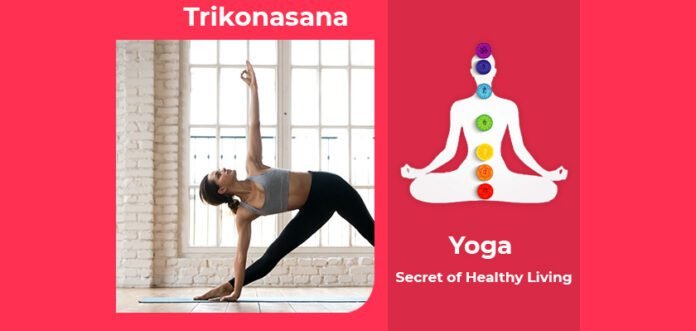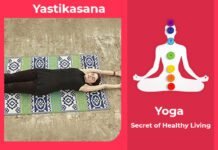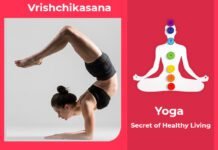What is Trikonasana
Trikonasana Trikonasana, the Triangle Pose, concludes the yoga postures in our Basic Session.
- It increases the movement of the Half Spinal Twist Yoga Pose, and gives an excellent stretching to the muscles around the side of the spine, improves health of the spinal nerves and helping the proper functioning of the digestive system.
Also Know as: Triangle Posture, Trikon Asan, Trikona Asan, Side Bend Pose
How to start this Asana
- Stand with your feet well apart (about 3-4 feet).
- Point your left foot to the left, and your right foot slightly to the left.
- Stretch your arm out at shoulder level and bring the right arm straight up, against your right ear.
- Now inhale.
- As you exhale, bend to the left and slightly forward to bypass your ribs.
- Slide your left hand down your left leg and hold on to the lowest part you can reach.
- Look out at your right hand.
How to end this Asana
- Take several full breaths in this position before releasing it.
- Repeat, bending to the right.
Video Tutorial
Benefits of Trikonasana
According to research, this Asana is helpful as per below(YR/1)
- Its practice makes the spine flexible.
- This is advantageous in back pain (hip).
- Those suffering from cervical and lumbar spondilitis and hypertension should not do this asana.
Precaution to be taken before doing Trikonasana
As per several scientific studies, precautions need to be taken in diseases mentioned as per below(YR/2)
- Do not bend legs at the knees.
- Judge your limitations.
So, consult your doctor if you have any of the problem mentioned above.
Histroy and scientific base of Yoga
Due to the oral transmission of sacred writings and the secrecy of its teachings, yoga’s past is riddled with mystery and confusion. Early yoga literature were recorded on delicate palm leaves. So it was easily damaged, destroyed, or lost. Yoga’s origins may be dated back over 5,000 years. However other academics believe it could be as old as 10,000 years. Yoga’s lengthy and illustrious history may be split into four distinct periods of growth, practise, and invention.
- Pre Classical Yoga
- Classical Yoga
- Post Classical Yoga
- Modern Yoga
Yoga is a psychological science with philosophical overtones. Patanjali begins his Yoga method by instructing that the mind must be regulated – Yogahs-chitta-vritti-nirodhah. Patanjali does not delve into the intellectual underpinnings of the need to regulate one’s mind, which are found in Samkhya and Vedanta. Yoga, he continues, is the regulation of the mind, the constraint of the thought-stuff. Yoga is a science based on personal experience. The most essential advantage of yoga is that it helps us to maintain a healthy bodily and mental state.
Yoga can help to slow down the ageing process. Since aging starts mostly by autointoxication or self-poisoning. So, we can considerably limit the catabolic process of cell degeneration by keeping the body clean, flexible, and properly lubricated. Yogasanas, pranayama, and meditation must all be combined to reap the full advantages of yoga.
SUMMARY
Trikonasana is helpful in increase flexibility of muscles, improves shape of the body, reduce mental stress, as well improves overall health.




